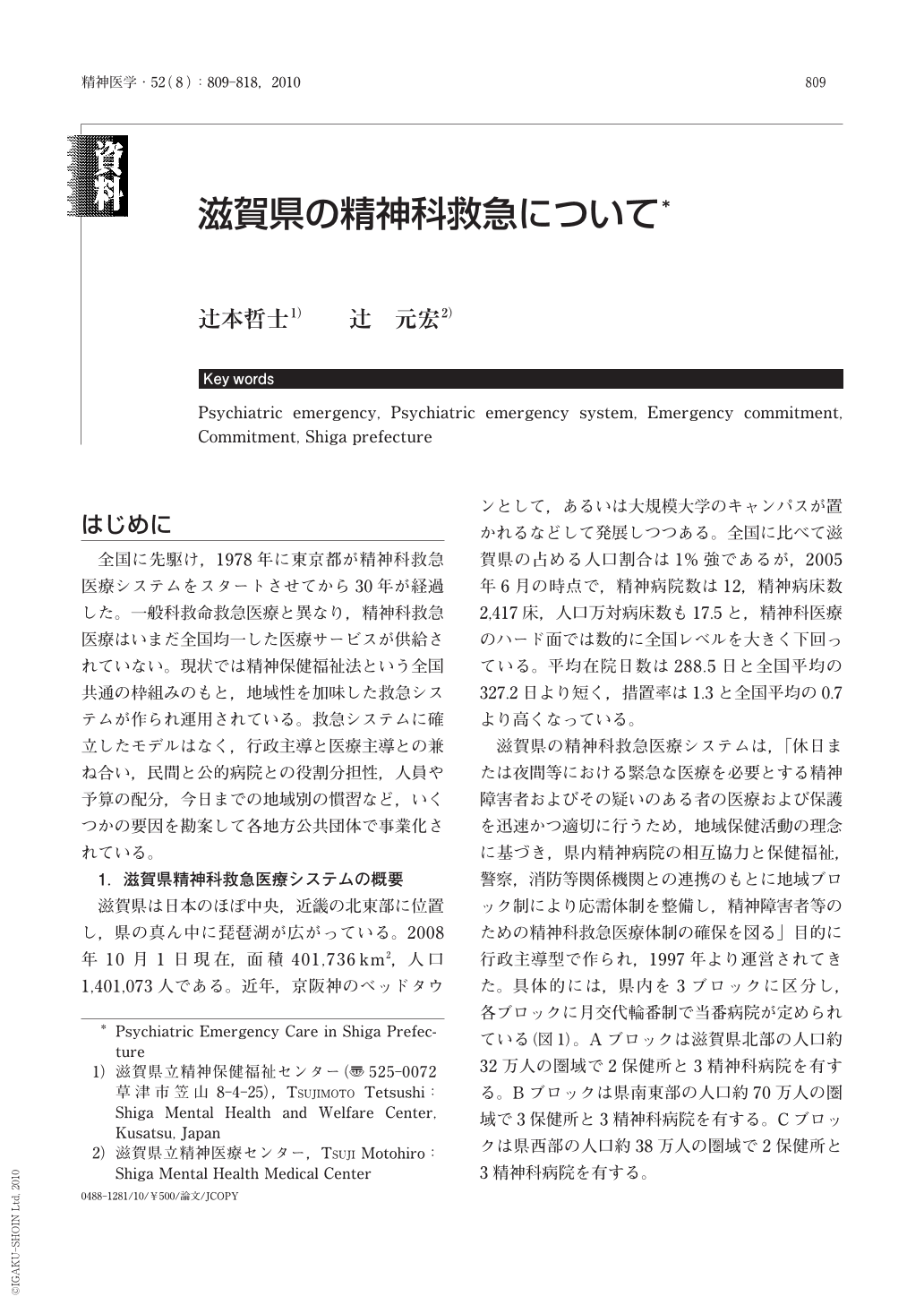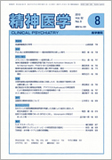Japanese
English
- 有料閲覧
- Abstract 文献概要
- 1ページ目 Look Inside
- 参考文献 Reference
はじめに
全国に先駆け,1978年に東京都が精神科救急医療システムをスタートさせてから30年が経過した。一般科救命救急医療と異なり,精神科救急医療はいまだ全国均一した医療サービスが供給されていない。現状では精神保健福祉法という全国共通の枠組みのもと,地域性を加味した救急システムが作られ運用されている。救急システムに確立したモデルはなく,行政主導と医療主導との兼ね合い,民間と公的病院との役割分担性,人員や予算の配分,今日までの地域別の慣習など,いくつかの要因を勘案して各地方公共団体で事業化されている。
1.滋賀県精神科救急医療システムの概要
滋賀県は日本のほぼ中央,近畿の北東部に位置し,県の真ん中に琵琶湖が広がっている。2008年10月1日現在,面積401,736km2,人口1,401,073人である。近年,京阪神のベッドタウンとして,あるいは大規模大学のキャンパスが置かれるなどして発展しつつある。全国に比べて滋賀県の占める人口割合は1%強であるが,2005年6月の時点で,精神病院数は12,精神病床数2,417床,人口万対病床数も17.5と,精神科医療のハード面では数的に全国レベルを大きく下回っている。平均在院日数は288.5日と全国平均の327.2日より短く,措置率は1.3と全国平均の0.7より高くなっている。
滋賀県の精神科救急医療システムは,「休日または夜間等における緊急な医療を必要とする精神障害者およびその疑いのある者の医療および保護を迅速かつ適切に行うため,地域保健活動の理念に基づき,県内精神病院の相互協力と保健福祉,警察,消防等関係機関との連携のもとに地域ブロック制により応需体制を整備し,精神障害者等のための精神科救急医療体制の確保を図る」目的に行政主導型で作られ,1997年より運営されてきた。具体的には,県内を3ブロックに区分し,各ブロックに月交代輪番制で当番病院が定められている(図1)。Aブロックは滋賀県北部の人口約32万人の圏域で2保健所と3精神科病院を有する。Bブロックは県南東部の人口約70万人の圏域で3保健所と3精神科病院を有する。Cブロックは県西部の人口約38万人の圏域で2保健所と3精神科病院を有する。
当番病院は救急応需のために空床と精神保健指定医を確保し,平日夜間・休日の精神科救急に備える。措置症状を持つなどの精神科症例が救急対応を必要とした場合,警察,消防,親族などの関係者はブロック内の保健所に通報し介入が始まる。担当保健所保健師は,発生状況を調査するとともに当番病院に連絡し,措置・緊急措置対応として受診・入院の段取りをつける。保健師は関係機関の協力のもと,ケースを当番病院まで搬送する。当番病院では指定医による緊急措置診察が行われて入院などの処遇が決定される。任意入院や医療保護入院になった場合は,そのまま当番病院で入院治療が行われ,緊急措置入院になった場合には72時間以内に正式の措置診察が行われる。県下の全民間精神科病院7病院と公的精神科病院2病院がこのシステムに参加している。輪番病院としてこのシステムには入らないが,合併症など全身管理が必要な事例に対しては総合病院1病院が協力する。このような「行政モデル」としての精神科救急医療システムは,法的な枠組みを作ることにより精神科救急患者に対して手厚く均質・確実な対応を保障する。また,輪番制を活用することでケースの特定病院への一極集中を防ぐこともできる。対象の中心を統合失調症圏や躁状態の患者に置くため,入院率や非自発入院比率が高く,入院形式も措置・緊急措置が多くなる。一方で警察経由の事例が多数を占めることとなり,受け入れるゲート幅を適切にしないとユーザーにとっては利便性に欠けたシステムになってしまう。日々,受け入れ環境を維持していくために当番病院の空床・指定医確保が不可欠で,夜間休日にオンコール体制に置かれる保健所保健師・事務員の心理的・身体的負担も大きい。全国では埼玉県,群馬県,茨城県などが類似した精神科救急システムを持っている。
精神科救急対応と社会復帰施設・地域医療体制の充実は車の両輪にたとえられる。滋賀県の2005年の社会復帰の施設状況としては,精神障害者小規模作業所13か所,通所授産施設7か所,地域生活支援センター7か所,精神障害者居宅生活支援事業の利用者161人,精神障害者グループホーム19か所で定員86人といったところで,数的には全国の平均レベルにある。現場での社会復帰に関する意識・意欲は高く,モデルといわれる「障害者サービス調整会議」を前身に全県域的に地域自立支援協議会が設置され,地域生活の支援体制整備に向け「関係機関などのネットワークの構築」「相談支援体制整備」が各圏域で実施されている。
2.滋賀県立精神医療センター(以下,精神医療センター)の概要
精神医療センターは滋賀県の南部にあり,もともと精神保健総合センターとして診療局部門・デイケア部門・精神保健センター部門の3部門が1つにまとまった総合施設で1993年10月に開院した。病院機能は主に診療局が担っており,平日の2~5診での外来診療と50床ずつ2つの閉鎖病棟,合計100床の病床で成り立ち,急性期患者に対応できる個室・保護室は両病棟合わせて28床ある。2006年度からは,地方公営企業法全部適用にて,精神保健センター部門は精神保健福祉センターとして独立し,現在では精神医療センターは診療局とデイケア科,新たに設けられた地域生活支援室で成り立っている。県立病院として県全体の精神医療のバランスをとる役割があり,救急に関しても当番病院のバックアップ病院として位置づけられている。当番病院が満床になったり,処遇に苦慮するケースに対しては積極的に入院を応需している。
このように滋賀県は,いわゆる「硬い」救急で輪番病院による精神科救急システムを運営してきた。今回,滋賀県という1地方非大都市圏の精神科救急を中心とした現状と県立精神病院の役割・実績について報告する。
Currently, there is no national medical service model for psychiatric emergency medical care. Therefore, each prefecture has its own medical care system, depending on its capacity.
This article will report on the present situation, the role and the capacity of Shiga prefecture, and its prefectural public hospitals as an example of psychiatric emergency medical care in a non-urban setting.
This article will deal with cases in which patients requiring psychiatric intervention benefitted from the government-regulated psychiatric emergency medical care system in hospitals or health centers while on duty. Our study period ranges from April 1, 2005 to March 31, 2008. Differences between gender, age, form of hospitalization, and psychiatric diagnosis and progress were analyzed at individual hospitals in Shiga prefecture, as well as at the Shiga Mental Health Medical Center. Within Shiga prefecture, there were 479 recorded cases, out of which 361 cases received emergency commitment consultation or commitment consultation. One hundred and sixty five patients were involuntarily hospitalized, 98 were hospitalized with their family's consent, and 18 were voluntarily hospitalized. One hundred and ninety four patients did not need hospitalization.
The Mental Health Medical Center received 66 admission requests out of which 26 were involuntarily hospitalized, 17 were hospitalized with their family's consent, 5 were voluntarily hospitalized, and 18 did not require hospitalization. The cases admitted at the Mental Health Medical Center, as well as the other prefectural institutions comprised of 60% male patients, predominantly in their 30s. Of these, 30 to 40% were involuntarily hospitalized, and 70% were diagnosed as schizophrenic. At the Mental Health Medical Center, 70% were released from the hospital within 6 months, and 20% of those involuntarily hospitalized stayed for more than one year. Moreover, compared to the cases of hospitalization with the family's consent, cases of commitment hospitalization had a tendency to take longer before being released from physical restraint or other forms of confinement. Taking these cases into account, we therefore examined acute care and the psychiatric emergency care system.

Copyright © 2010, Igaku-Shoin Ltd. All rights reserved.


